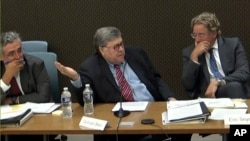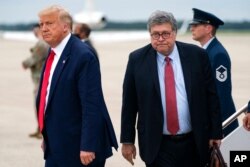Former President Donald Trump declared victory in the 2020 election despite being repeatedly told by aides that he had not won, according to testimony heard during the second public hearing of the House committee investigating the January 6, 2021, attack on the U.S. Capitol.
Trump’s “big lie” that the election had been “rigged” and stolen led hundreds of his supporters to storm the U.S. Capitol, Representative Zoe Lofgren, a committee member, said in her opening statement.
Here are four takeaways from the hearing.
Trump declared victory against the advice of his aides and advisers.
In a deposition to the committee, Trump campaign manager Bill Stepien said that before the election, he had briefed Trump about the likelihood that an early lead on election night would melt away after mailed-in Democratic votes were counted. The phenomenon, known as “red mirage,” gave Trump a false sense of victory.
Stepien, several other advisers and Trump’s daughter Ivanka Trump testified in depositions that on election night, with millions of votes yet to be counted, they did not believe Trump was in a position to declare victory. Yet the president was determined to proclaim himself the winner.
Stepien was scheduled to testify in person before the House panel on Monday but pulled out an hour before his appearance because of a family emergency. His lawyer appeared instead and read a statement on the record.
Instead of listening to his own campaign manager, Trump followed the advice of Rudy Giuliani, a Trump confidant who had been pushing a conspiracy theory that the election had been stolen, according to testimony by several aides.
“I think, effectively, (former New York City) Mayor Giuliani was saying that we won it, and that anyone who didn’t agree with that position was being weak,” senior Trump adviser Jason Miller testified. He added that Giuliani was “definitely intoxicated” at the White House.
Around 2:20 a.m., Trump held a press conference to announce he had beaten Democrat Joe Biden.
“We want all voting to stop,” Trump said. “We don’t’ want to find any ballots at 4 o’clock in the morning and add them to the list.”
Former attorney general repudiated Trump’s election fraud claims.
The hearing’s star witness, Trump’s second attorney general, Bill Barr, offered a devastating repudiation of Trump’s election fraud claims, calling them “nonsense,” “bogus” and “bullshit.”
In recorded testimony, Barr recalled meeting with Trump at the White House on November 24.
With two senior aides in attendance, Trump insisted that “there had been major fraud and that as soon as the facts were out, the results of the election would be reversed,” Barr said.
When Trump sarcastically suggested that “apparently the Department of Justice doesn’t think it has a role of looking into these fraud claims,” Barr said he responded by saying that the agency in fact had probed the allegations but had found them baseless.
A week later, Barr gave an interview to The Associated Press, saying the Department of Justice had “not seen fraud on a scale that could have affected a different outcome in the election.”
Trump was furious.
“The president said, ‘You’re killing me. You didn’t have to say this,'” Barr recalled Trump telling him when the two met later in the day.
When Trump alleged that there had been a “vote dump” in Detroit, Barr said he explained to him that nothing nefarious had taken place.
“And I told him that the stuff that his people were shoveling out to the public was bullshit,” Barr testified.
The former attorney general said he became “demoralized” to find Trump “detached from reality,” uninterested in facing the facts.
“My opinion then and my opinion now is that the election was not stolen by fraud,” Barr said.
Trump was not moved. The very next day, “the president released video rehashing some of the same claims his chief law enforcement officer said were, quote, ‘nonsense,'” Lofgren said.
Justice Department carried out ‘dozens of investigations’ of voter fraud.
Richard Donoghue, who served as acting deputy attorney general during the final months of Trump’s presidency, testified that he told Trump multiple times that the Justice Department had investigated the allegations of fraud in battleground states such as Georgia, Michigan, Nevada and Pennsylvania but had found no evidence of corruption.
“I told him something to the effect of, ‘Sir, we’ve done dozens of investigations and hundreds of interviews. The major allegations are not supported by the evidence developed,'” Donoghue said.
Among the allegations: a claim that a truck drove ballots from New York to Pennsylvania, and a separate allegation that a suitcase of fraudulent ballots was moved out from under a table at a voting center in Georgia. The allegation about the black suitcase was aired by Giuliani.
Byung J. “BJay” Pak, a former Trump-appointed U.S. Attorney for northern Georgia, testified that his office had examined the claim about the suitcase at Barr’s request and had uncovered no impropriety.
“We found that the suitcase full of ballots … was actually an official lockbox where ballots were kept safe,” Pak testified.
The committee’s next hearing, scheduled for Wednesday, will focus on Trump’s ultimately unsuccessful attempt to enlist the Justice Department in his fight to stay in office.
Trump and his allies used claims of fraud to raise hundreds of millions of dollars.
The committee found that between Election Day and January 6, Trump and his allies leveraged its claims of election fraud to raise $250 million from supporters. Nearly $100 million came in the first week after the election, Lofgren said.
The money was supposed to support election-related litigation by Trump’s team. Instead, most of the money went to a “political action committee” that the former president created after the election, Lofgren said.
The PAC in turn made millions of dollars in contributions to protest organizations, including $1 million to Trump chief of staff Mark Meadows’ foundation, and another $1 million to a conservative organization that employs several former Trump administration officials, Lofgren said.
“The ‘big lie,’ was also the ‘big rip-off,'” she said.



